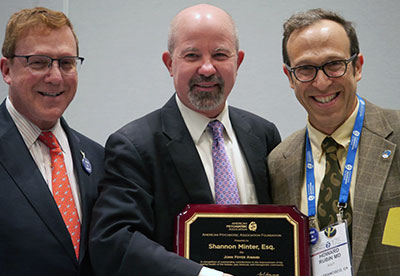Fryer Award Winner Urges Continued Advocacy for LGBTQ Community

“Mental health professionals have played a critical role in all of the legal gains that LGBTQ people have made in the past, and they have a critical role to play in every single one of our current battles,” said Shannon Minter, Esq., director of the National Center for Lesbian Rights, at the 2019 John Fryer Award Lecture on Tuesday afternoon. “That professional partnership has never been more important, and our ability to sustain it will largely determine the fate of the LGBTQ civil rights movement in the coming years.”
The John Fryer Award is named in honor of the psychiatrist who was part of a protest by gay psychiatrists at the 1972 APA Annual Meeting in Dallas. His courage led to the removal of homosexuality from DSM the following year. Fryer appeared at the meeting in a mask as Dr. Henry Anonymous and testified to the barriers confronting gay psychiatrists.
In his lecture, Minter recalled the history of the relationship between mental health advocates, particularly APA, and the gay rights movement and emphasized that the recent advances culminating in the 2015 Supreme Court decision in Obergefell v. Hodges legalizing same-sex marriage would not have been possible without that partnership. (In Obergefell, the court ruled that the 14th Amendment requires states to recognize same-sex marriage.)
“In the Obergefell case, there were 149 amicus briefs filed—a record number, more than in any other Supreme Court case,” Minter said. “Of those briefs, Justice Kennedy’s majority decision mentioned only five: one by the American Bar Association; one by the Department of Justice, representing the U.S. government; one by historians of marriage; one by the Williams Institute, which cited the numbers of children being raised by same-sex parents; and one, arguably the most important, given its prominence in the opinion, by the American Psychological and Psychiatric associations and other similar groups.”
Minter also drew attention to recent and impending challenges to the LGBTQ community.
“It is no exaggeration to say that the modern LGBTQ rights movement owes its remarkable success to the unique partnership between legal advocates and mental health experts, who have shined the bright light of knowledge—of medical science, of evidence-based research, of fact—into the dark corners of our nation’s long history of bias against, and ignorance about, LGBTQ people,” he said. “That partnership has been evident in every major civil rights victory for our community, from the transformation of child custody and adoption laws, to the court’s 2015 decision on marriage equality in Obergefell v. Hodges, to the many recent court decisions concluding that President Trump’s transgender military ban is rooted in animus, not medical science.”
Minter said the Trump administration has created a hostile environment for the LGBTQ community. “Nationwide, LGBTQ youth continue to suffer acutely due to lack of parental and social support, as reflected most dramatically in the realities that more than 40 percent of homeless youth identify as nonheterosexual, as do nearly 20 percent of youth in foster care and juvenile detention facilities.”
Moreover, he said “conversion therapy,” discredited by APA and most mental health organizations, has undergone a resurgence. Also, the Department of Health and Human Services recently promulgated regulations that dramatically expand the ability of health care professionals to deny treatments and services that conflict with their religious beliefs, which is particularly likely to harm women, LGBTQ people, and people with HIV.
“John Fryer put his entire professional career at risk in order to stand up for what he knew to be the truth—that gay people are not mentally ill; that many gay people were, in fact, working successfully within the mental health profession; and that it was time for APA and other professional organizations to acknowledge that their negative view of gay people was based on social prejudice, not science,” Minter said. “The decade of the '70s, when John Fryer spoke out and used his voice as a psychiatrist to advocate for equality for gay people, was a watershed moment in our community’s history. APA’s decision to declassify ‘homosexuality’ as a mental disorder in 1973 opened the door to unprecedented legal and social gains and helped to reverse centuries of stigma and bias. Those gains allowed LGBTQ people to live openly and to rebut negative stereotypes by showing the world that LGBTQ people are their neighbors, family members, and coworkers—that LGBTQ people are part of the fabric of everyday life and contribute to this country in countless ways.
“We need John Fryer’s courage—and commitment to truth—more than ever today, when we are facing a concerted political effort to force LGBTQ people back into the closet and strip them of equality.”
(Image: David Hathcox)
|
|
|
|
|


